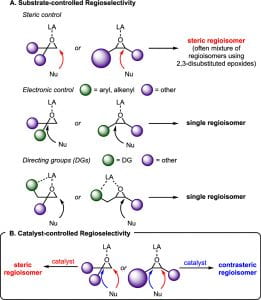Carbon monoxide (CO) is a readily available building block that introduces valuable functional groups into organic molecules. Our group has focused on the catalytic carbonylative ring-expansion of heterocycles, foremost the carbonylation of epoxides to β-lactones, which can be ring opened into aldol moieties, and succinic anhydrides. The resulting products are important monomers in the synthesis of biodegradable polymers and have emerging applications as fine chemicals and building blocks in pharmaceutical syntheses.
Our main objective is the development and mechanistic understanding of highly active and selective carbonylation catalysts. Over the years our group has introduced several catalytic systems of the general form [Lewis Acid]+[Co(CO)4]− that show reactivity for different substrate classes and applications, including regio- and enantioselective carbonylation. We also apply our carbonylation catalysts to current challenges in polymer synthesis. Examples include a highly efficient one-pot synthesis of the commercially relevant polymer poly(3-hydroxybutyrate) (PHB), and control over the microstructure of poly(beta-hydroxalkanoate)s through carbonylation.
Selected References:
- Hubbell, A. K.; LaPointe, A. M.; Lamb, J. R.; Coates, G. W. J. Am. Chem. Soc. 2019, 141, 2474–2480. doi: 10.1021/jacs.8b12286
-
Lamb, J. R.; Hubbell, A. K.; MacMillan, S. N.; Coates, G. W. J. Am. Chem. Soc. 2020, 142, 8029−8035. doi: 10.1021/jacs.0c02653
-
Hubbell, A. K.; Lamb, J. R.; Klimovica, K.; Mulzer, M.; Shaffer, T. D.; MacMillan, S. N.; Coates, G. W. ACS Catal. 2020, 10, 12537−12543. doi: 10.1021/acscatal.0c03492
-
Hubbell, A. K.; Coates, G. W. J. Org. Chem, 2020, 85, 13391−13414. doi: 10.1021/acs.joc.0c01691


